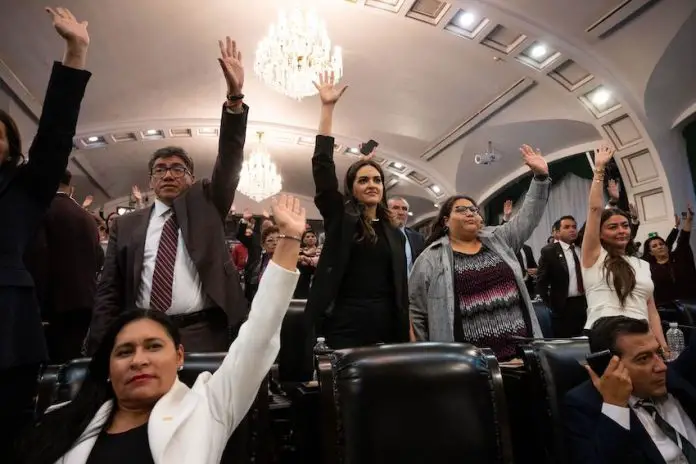The Mexican Senate approved the federal government’s controversial judicial reform proposal on Wednesday morning, delivering a major victory to President Andrés Manuel López Obrador less than three weeks before he leaves office.
The constitutional bill — whose most controversial aspect is the article allowing citizens to directly elect Supreme Court justices and thousands of other judges — will now be considered by Mexico’s 32 state legislatures. It was approved by the lower house of Congress last week.
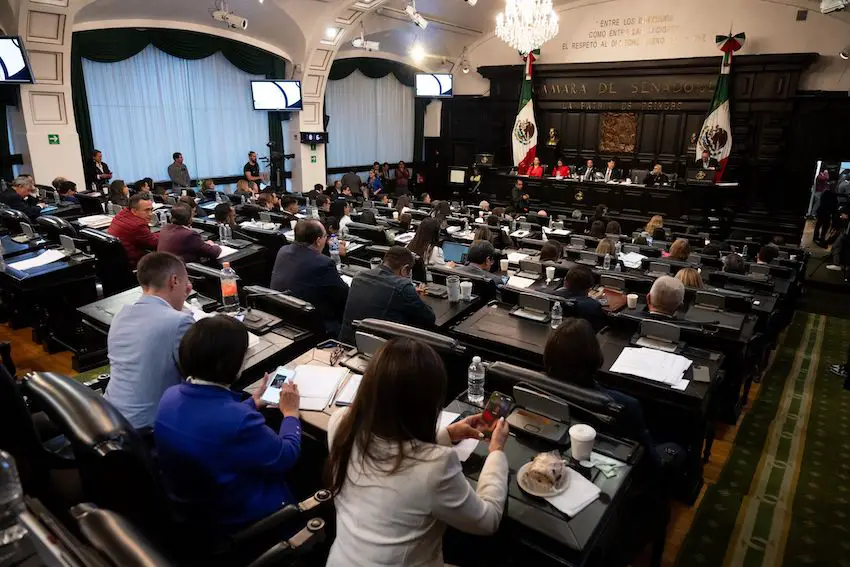
If a majority of state legislatures ratify the bill — essentially a fait accompli given that the ruling Morena party controls more than 20 Congresses — the president can sign the reform into law.
In a marathon “double session” that began on Tuesday in the Senate and continued into the night and the early hours of Wednesday morning in an alternative venue, 86 senators voted in favor of the reform, 41 opposed it and one opposition senator was absent.
Morena and its allies thus achieved the supermajority required to pass the bill, which was approved en lo general, or in a general, broad sense, and en lo particular — i.e. after consideration of individual articles, none of which were modified.
All 85 Morena, Labor Party (PT) and Green Party (PVEM) senators voted in favor of the judicial reform, while the additional vote came from National Action Party (PAN) Senator Miguel Ángel Yunes Márquez, who was accused of being a “traitor.”
Several sources suspect that Yunes Márquez and his father, former Veracruz governor Miguel Ángel Yunes Linares, reached a deal with Morena that would result in the withdrawal of criminal charges against the two men and Yunes Márquez’s brother Fernando. Yunes Linares, a “substitute senator” for the PAN, stood in for his son for a period on Tuesday, but Yunes Márequez, who had requested leave to attend to health issues, returned in time to participate in the historic vote.
The legislative session was relocated to the old Senate building in the historic center of Mexico City after protesters broke into the current Senate building, located on the Paseo de la Reforma boulevard.
Critics of the judicial reform, including United States Ambassador to Mexico Ken Salazar, contend that the direct election of judges will lead to the politicization of the judiciary and eliminate a vital check on executive power.
They argue that Supreme Court justices and other judges sympathetic to Morena will come to dominate the judiciary as the president and the Congress — which the ruling party controls — will nominate candidates.
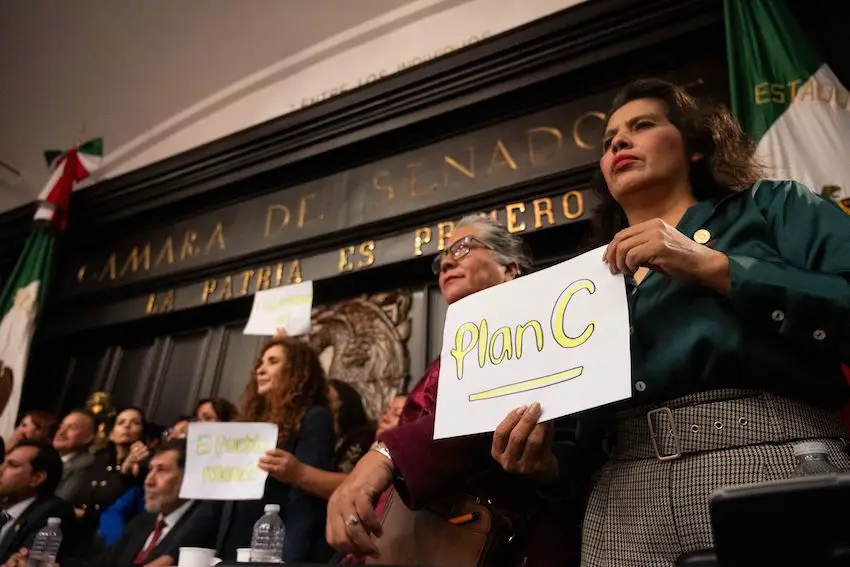
There are also concerns that the enactment of the judicial reform will have a negative impact on foreign investment and Mexico’s trade relations, including those with its key regional partners, the United States and Canada. Thousands of court workers have gone on strike to protest the plan, while the Mexican peso has taken a hit due to concern over the reform’s impact on the rule of law and the Mexican economy.
López Obrador and President-elect Claudia Sheinbaum reject claims that the election of judges will result in a loss of independence for the judiciary and argue that an overhaul is needed to stamp out corruption in the judicial branch of government.
Among the other changes in the judicial reform bill are:
- The reduction of the number of Supreme Court justices to 9 from 11.
- The reduction of justices’ terms to 12 years from 15.
- The reduction of the experience required to serve as a justice and judge.
- The adjustment of salaries so that no judge earns more than the president.
- The elimination of the Federal Judiciary Council.
- The creation of a Tribunal of Judicial Discipline that could sanction and fire judges found to have acted improperly or illegally.
- The use of “faceless,” or unidentified judges, to preside over organized crime cases.
- An expansion of the crimes for which pre-trial detention can be enforced.
Given the approval of the reform bill in the Senate, it now appears almost certain that Mexico will hold its first judicial elections in 2025. All Supreme Court positions and thousands of other judgeships, including federal ones, will be up for grabs.
Senators express views and trade barbs
Morena Senator Lucía Trasviña accused opposition senators of being a “bunch of traitors” for voting against the judicial reform, seen as the biggest overhaul to Mexico’s judiciary in 30 years.
She asserted that the judiciary “has been at the service of the oligarchy” and foreign interests for decades.
While Morena defends the interests of the Mexican people, the opposition defends “the illegitimate interests of thugs and white-collar criminals,” Trasviña said.
The senator labeled Supreme Court Chief Justice Norma Piña “a traitor to the homeland,” accusing her of failing to hold the perpetrators of various crimes to account.
“Norma Piña protects the interests of foreigners who have come to loot our resources,” Trasviña said.
Institutional Revolutionary Party (PRI) Senator Claudia Anaya called on Morena, PT and PVEM senators to stop their insults, demonstrate “restraint” and engage in “frank” but “respectful” dialogue.

Senator Alejandro Moreno, national president of the PRI, declared that it was a “sad day for our Mexico.”
He said that the reform “was approved in the Senate via the worst tricks and under unimaginable pressures and coercions.”
Yunes Márquez, who cast the defining vote, signaled his intention to support the reform in a speech to his colleagues.
“I know that the reform to the judicial power … is not the best. I also know that we will have the opportunity to perfect it in the secondary laws,” he said.
“That’s why, in the most difficult decision of my life, I’ve decided to give my vote in favor of the bill in order to create a new model for the delivery of justice,” Yunes Márquez said.
He said that he hadn’t faced pressure from Morena to vote in favor of the reform, but was pressured to vote against it by his own party.
“I had never seen in the PAN such a crude attempt at imposition and subjugation,” Yunes Márquez said.
He said he was subjected to “threats and aggression” from those who “wanted to force me” to vote against the reform “without analyzing it or debating it.”
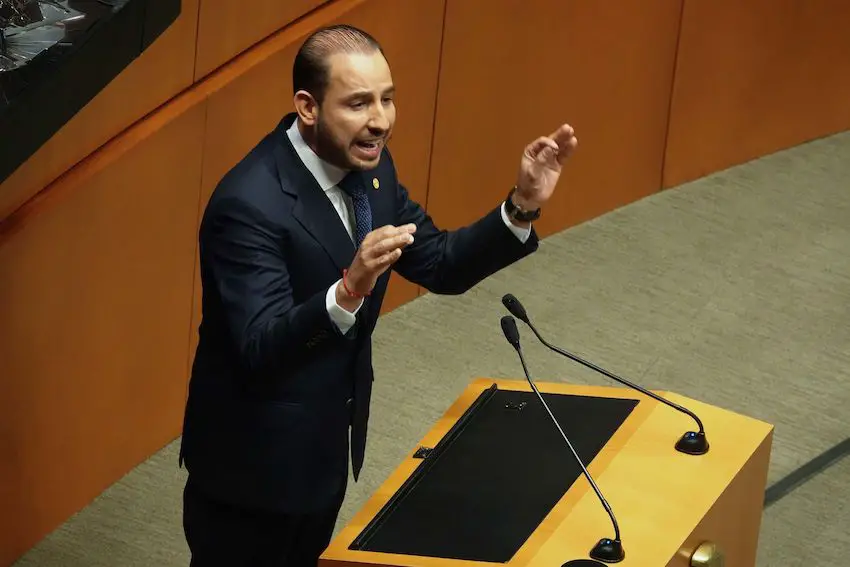
Senator Marko Cortés, the national president of the PAN, accused his colleague of betraying the party.
“You should have been more decent, my dear friend. You should have taken our call and told us: ‘I’m going to betray you,'” he said.
Cortés also accused the government of reaching an “impunity pact” with the Yunes family.
Senate President Gerardo Fernández Noroña, a Morena senator, accused opposition parties of letting protesters into the Senate building.
A large group of protesters burst into the Senate on Tuesday evening, caused damage to the legislative chamber and shouted chants in support of opposition senators.
“The judicial power will not fall,” they said. “You are not alone,” they told opposition senators.
AMLO: ‘Nothing’ was negotiated with the Yunes family
At his morning press conference on Wednesday, López Obrador said that it is public knowledge that he has “differences” with members of the politically powerful Yunes family, but denied that the government reached a deal that resulted in Yunes Márquez’s vote in favor of the judicial reform proposal he sent to Congress in February.
“Absolutely nothing” was negotiated, he said. “… I can tell you I didn’t speak with Mr. Yunes or his son.”
López Obrador said that Morena’s leader in the Senate, Adán Augusto López, “possibly” spoke with them, but asserted “that is his job” as a legislator.
“I sent the initiative and it’s the lawmakers who have to do their work,” he said, before advising “oligarchs” and opposition politicians to “look for another interpretation” of why Yunes Márquez voted in favor of the judicial reform.”
“The oligarchs who felt they were the owners of Mexico and their spokespeople should look for another interpretation that is not as simplistic as give and take, that of the bargaining chip, the mafioso relationship,” López Obrador said.
“… What must be thought is that this reform is needed. … [Yunes] is a politician who considered it a good idea to act in this way and it wasn’t necessarily in exchange for an amount of money or [due] to a threat,” he said.
López Obrador also said that he is “very happy” with the approval of the judicial reform, and declared that Mexico “will provide an example to the world.”
Mexico will become one of a small group of countries where judges are elected by citizens.
The New York Times recently reported that “the closest parallel to what Mexico’s president is proposing is Bolivia’s experience with electing judges after enacting a new constitution in 2009.”
“But even in Bolivia’s case, the changes didn’t apply to the entire judiciary, focused instead on how some of the most powerful judges can be elected by popular vote instead of being selected by Congress.”
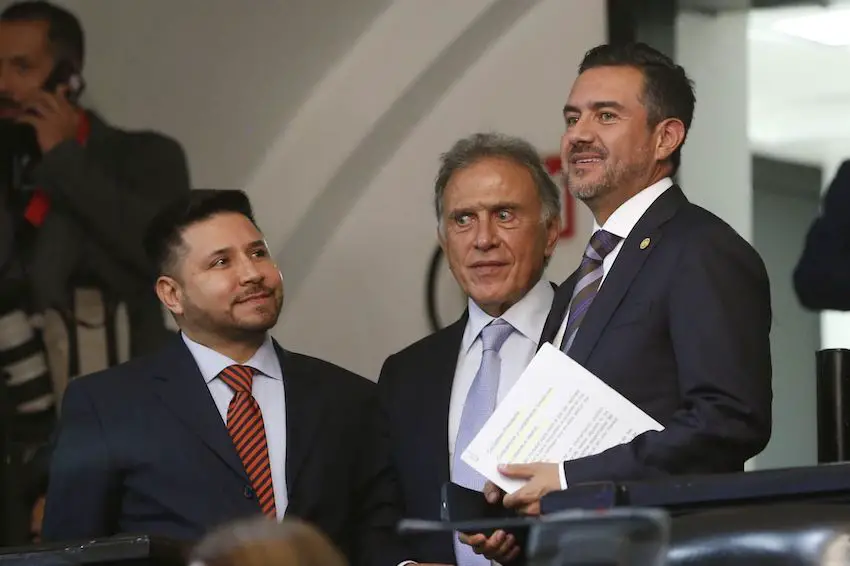
Sheinbaum: The election of judges will ‘strengthen’ Mexico’s justice system
In a post to social media on Wednesday morning, President-elect Sheinbaum congratulated the senators “of our movement” for approving the judicial reform.
“With the election of judges, justices and magistrates, the delivery of justice in our country will be strengthened,” she wrote.
“The regime of corruption and privileges is increasingly being left in the past and a true democracy and true rule of law is being built,” said Sheinbaum, who will be sworn in as Mexico’s first female president on Oct. 1.
“Demos means people, kratos: power. The power of the people,” she wrote.
In a social media post last week, Sheinbaum asserted that the judicial reform won’t “affect our trade relationships or private national and foreign investment.”
“In contrast, there will be an improved rule of law and more democracy for everyone,” she said.
“… Our interest is nothing more than a more democratic and fairer Mexico. That was the popular mandate.”
With reports from El Universal, Reforma, Milenio, El Financiero, El País and Reuters
